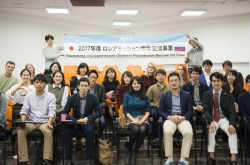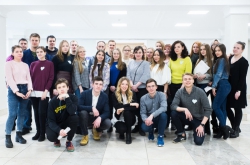The program
The trip will take place between August 20 and 28, with students first arriving in Kyoto, where they’ll get to learn about the city’s cultural and historical sights. Then, the group will travel to Osaka where they’ll learn about the city’s rich history and go on a tour of an industrial site. In these two cities students will also attend various educational courses, including teamwork-based economics and history of Japan classes. Then, they’ll visit Nagasaki, paying a visit to the Nagasaki Atomic Bomb Museum, the Peace Park, and attending seminars on sustaining global peace. Finally, the group will travel to the country’s capital, Tokyo. Throughout the trip they get to stay not only in hotels, but also with Japanese host families, allowing them to become immersed in the nation’s everyday life and ancient traditions.
Both the Russian and the Japanese participants will converse in English, although the use of Japanese is not frowned upon. For many Japanese students accompanying the Russian group, it will, too, be their first time visiting some of these places, which makes the program a truly unique experience for both sides.

Taking part
In order to participate, students submit a personal application, a motivation letter, and a certificate of their proficiency in the English language.
It must be said that all of the participants’ expenses during their stay in Japan are covered by the receiving side; however, tickets to Japan and back, as well as medical insurance, must be provided by the students. Another condition for all applicants is that they are able to host two Japanese students on a trip to Russia in their homes on September 16-19, 2018.
What does one write in a motivation letter? How is it evaluated? According to those who took part in last year’s exchange, those who are truly “into” Japan have the most chances to be picked; that is, those who are truly interested in the nation’s culture and history, and not those who simply want to take a trip somewhere exotic.

About the program
This is the ninth time that ITMO University is participating in the Japanese-Russian youth exchange program, organized by the Junior Chamber International Japan. This year, 20 Russian students from ITMO University, Moscow State University and St. Petersburg State University will have the chance to participate. 20 students from more than 10 Japanese universities will, likewise, visit Russia on a similar trip.
According to Russian students’ testimonies, in Japan the students get to visit numerous cultural heritage sites and learn about the traditions that live on in current-day Japanese families. They also emphasized that one shouldn’t be afraid of misunderstandings: the Japanese people are very hospitable and all cultural barriers are brought down by genuine honesty.
In September, when Japanese students will come on a return visit to Russia, they, too, will learn about the culture and history of the various cities and visit educational centers. Last year, for instance, the Japanese delegation took a tour of several Moscow universities and ITMO University’s laboratories. Members of the group noted that programs like this one help the members of the two nations understand each other better and acknowledge the meanings of certain cultural traits.
“A trip to Japan isn’t something to be afraid of: first of all, Japan is one of the world’s safest countries. Throughout the entire trip, starting from the airport in Kyoto and ending with the airport in Tokyo, the students will be accompanied by members of the Junior Chamber International Japan and students of Japanese universities. Second of all, there’s no reason to be afraid of failing to communicate with Japanese people on the street because their English is lacking or the like. They’ll explain everything with gestures, or maybe even take your hand and lead you to where you need to go. Japan is a nation of courteous people! It’s a country with unique history and culture. All anyone who gets selected for the program has to do is enjoy their trip!” – says Olga Ovsyannikova, head of ITMO University’s Academic Mobility Support Office.





